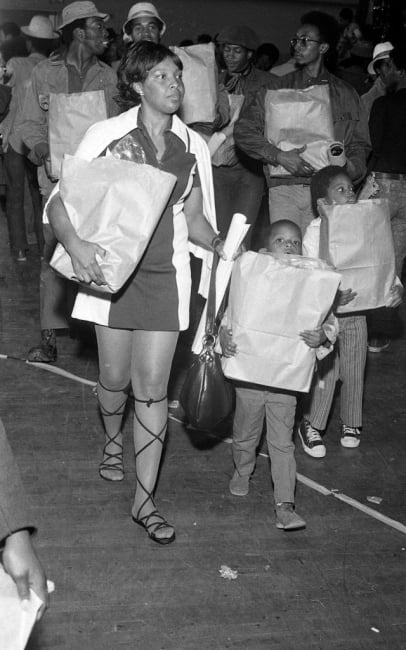You have /5 articles left.
Sign up for a free account or log in.

Black Panthers provide free groceries to the needy at a 1972 Black Community Survival Conference.
San Francisco Chronicle/Hearst Newspapers/Getty Images
This month, it will be 55 years since Bobby Seale and my late husband, Huey P. Newton, founded the Black Panther Party. As the co-founder of the Dr. Huey P. Newton Foundation, I have worked to redirect media and law enforcement attacks on the legacies of Black movements into purposeful educational experiences that tell comprehensive and authentic histories.
Since the murder of George Floyd, many people have developed a newfound awareness of how systemic racism is perpetuated in America’s political economy. From the criminal justice system and severe homelessness in California to gross health-care disparities for Black women and racial biases in news media, we are reminded of the many ways in which slavery and other political choices to uphold white supremacy and capitalism have been baked into the foundations of our society, preventing our collective progress.
Higher education is also experiencing a wave of reckoning around its own racial history, including segregation and commemorations of segregationists, along with present-day barriers like the outcry against critical race theory and the narrowing access to college. As we continue to see the movement for Black and brown liberation evolve and grow, it is vital that the next generation understand the legacy of older generations of Black movement leaders, like the Black Panther Party, and that this history and legacy be meaningfully incorporated into the broader American history curriculum.
In the 1960s and ’70s, J. Edgar Hoover, then director of the FBI, propagated the lie that the Black Panthers were a militant threat to the status quo. But the perception of the Panthers was not reality. In cities across America, they were providing free breakfasts for children, legal services, medical clinics and research into sickle cell anemia, and political education. And it was Fred Hampton, chairman of the Illinois chapter of the party in Chicago who, recognizing the power of multicultural unity for a common cause, created the Rainbow Coalition -- joining forces with other oppressed peoples in the city to fight for equality and political empowerment.
That is the legacy the Dr. Huey P. Newton Foundation has been working to protect and amplify for more than 25 years. As the founder of the foundation, as Huey’s widow and as a former member of the Black Panthers, my lived experiences did not mirror in any way, shape or form what was being shared in the news with the public and that later trickled into textbooks in perpetuity. The mission of the Dr. Huey P. Newton Foundation is to share and promote the accurate history of the party and the work its members did in communities around the world, as well as the love they had for the people they served, body and soul. Through public art and storytelling, indexing and digitizing the Black Panther Party newspaper to make our history accessible to the public, and numerous other efforts, we are creating the tools necessary for everyone to learn the full truth of the Black Panther Party.
The Academy Award-winning film Judas and the Black Messiah also helped spark a cultural reawakening around this history in a way that the general public had yet to see in mainstream media. For the first time on the big screen, the disgraceful history of the FBI’s counterintelligence program, COINTELPRO, which worked to disband all Black and leftist movements, was shown through the story of Chairman Hampton and the Chicago chapter of the Black Panther Party. The film was released in the midst of renewed calls for justice after the countless instances of police violence toward Black communities. The protests that have occurred over the last year are a part of the long tradition of our movement, and the film has amplified the continuities between generations in our quest for Black liberation.
Participant, the leading media company dedicated to entertainment that inspires audiences to engage in positive social change, co-financed and executive produced the film. It has launched a campaign in partnership with our foundation to educate audiences with a more accurate history of the Black Panther Party and empower them to join local organizations bettering Black communities. Using the film as a natural entry point for students, one of the core tenets of the campaign was developing a curriculum that will help educators and community organizations reframe and reclaim this history.
The guide, which is available on the Judas and the Black Messiah impact campaign’s website, has been designed as a tool and resource for discourse not only about Judas and the Black Messiah, but for all movements across the country fighting for equity and liberation. This guide includes a call to action, which will direct users to resources on how to get involved in current political, social and economic movements locally and nationally. Beyond our foundation, Participant is working with some organizations in Chicago, including DePaul University and the MAAFA Redemption Project, to incorporate the guide into their curriculum, as well, so that students can unpack the rich hidden histories of America’s change makers.
Our foundation has also created a college course for contemporary movement building taught by Xavier Buck, deputy director of our foundation. His project-based college course will work with undergraduate and graduate students to help them think critically about how the Black Panther Party’s theory and praxis can be incorporated into contemporary movements. In addition, our foundation is moving forward with public art and visual history initiatives that we know will continue to build upon the incredible storytelling we engaged with in Judas and the Black Messiah. We have just installed Oakland’s very first permanent public art piece, a bust of Huey P. Newton, in honor of the party in the city where it was founded. We are also working on a museum and other public art initiatives, as well as with the National Park Conservancy to create a monument to the Black Panther Party within the national park system. We are digitizing 13 years of the Black Panther Party’s weekly newspaper. And there is so much more where we will share the accurate history of the Black Panther Party.
Films, like public art and historical archives, have the power to share different perspectives and help right wrongful, harmful narratives about their subject. Judas and the Black Messiah and the campaign tied to it helped propel this narrative shift around the Black Panther Party, but it is up to policy makers, higher education institutions and teachers to continue this work in the classroom.
To help celebrate the legacy of the Black Panther Party this month, visit HueyPNewtonFoundation.org and SaveTheHamptonHouse.org for initiatives and ways to join the movement -- and to continue to honor the mantle of social change.




